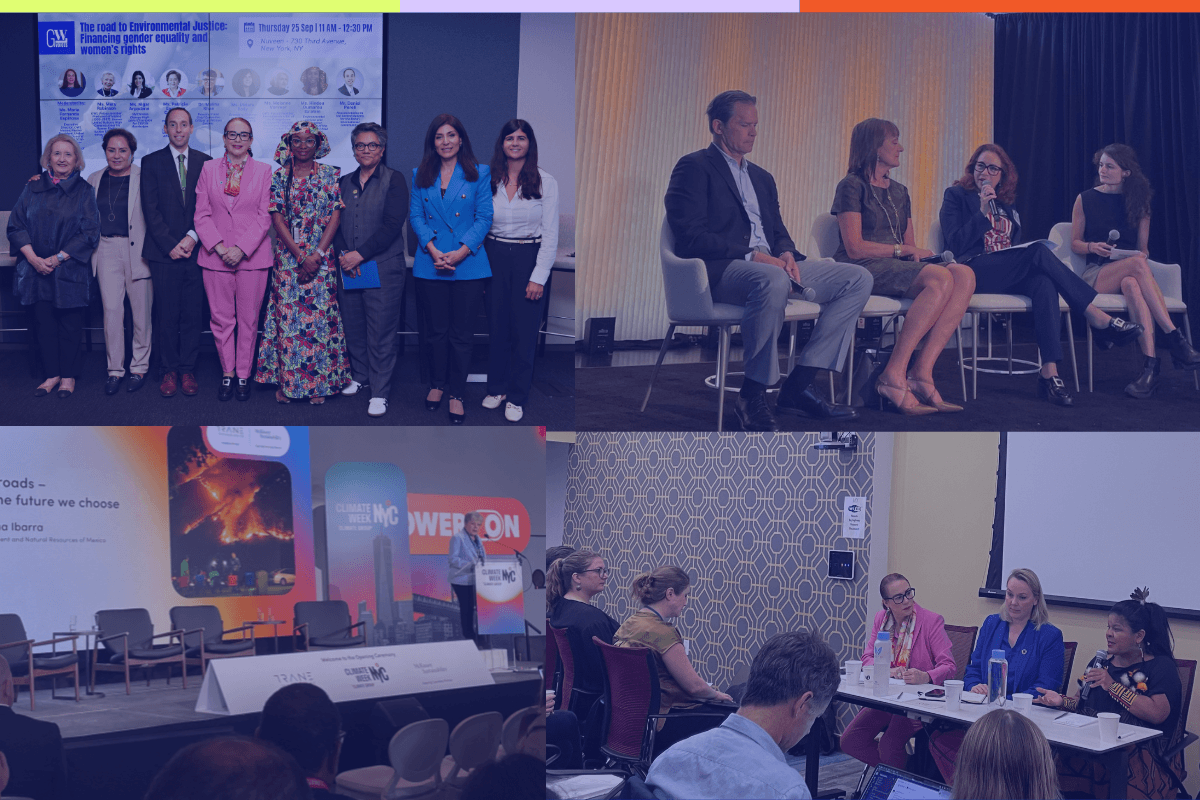From New York to Belém: What Climate Week Taught Us

Share
During Climate Week NYC, GWL Voices brought its voices and alliances to strategic spaces to highlight the importance of women’s leadership and perspectives in UN reforms for climate action. These were the three key lessons that stood out and point the way toward COP30 in Belém:
1. NDCs must be more than technical commitments
September 25 marked the extended deadline for the submission of Nationally Determined Contributions (NDCs). Although more countries have presented their plans since February, progress remains insufficient to keep the 1.5°C target alive.
The numbers tell the story: an analysis by GWL Voices showed that of the first 31 NDCs submitted , 87% mention women, but only one-third address climate finance with a gender perspective. Fewer than half mention girls, and only one-fifth acknowledge the lack of women’s representation in decision-making.
GWL Voices’ message is clear: NDCs cannot be limited to vague promises. They must include concrete roadmaps for climate action that ensures gender justice, inclusive financing, and real adaptation in communities.
2. Financing women is financing resilience
In the conversation between GWL Voices Executive Director, Ms. María Fernanda Espinosa, and, GWL Voices member, Ms. Mary Robinson, on the Climate Week NYC Daily Show, as well as across Climate Week dialogues, one truth became evident: there will be no climate justice without financial justice for women and girls.
Today, only 4% of official aid for climate adaptation and just 2% for mitigation have gender equality as a principal objective. The gap is deep, and so are its consequences: in the worst-case scenario, climate change could push an additional 158 million women and girls into poverty, compared to 131 million men and boys. by 2050.
Financing women entrepreneurs, indigenous communities, safeguarding biodiversity, and young leaders driving innovative solutions is not only a matter of justice—it is a strategy to transform entire economies and societies.
Furthermore, at the event “The Road to Environmental Justice: Financing Gender Equality and Women’s Rights”, organized by GWL Voices and Women Deliver, in collaboration with Plataforma CIPÓ and the Bahá'í International Community, Ms. Espinosa reminded participants of the steps ahead : “We need a COP30 for women by women, we need more women leading the negotiations and raising their voices.” She also stressed that “the new UNFCCC Gender Action Plan will not touch the ground if we don’t meet three essential requirements– money, capacity, and technology.”
From Ms. Robinson’s call to “switch the money in a massive way, cut fossil fuels” to GWL Voices member Patricia Espinosa’s insistence that “inclusion does not happen automatically”, the message was consistent: without gender-responsive finance, there will be no climate justice.
Funding women entrepreneurs, Indigenous communities, and young innovators is not charity—it’s strategy. It strengthens resilience, accelerates solutions, and transforms entire societies.
3. Women in leadership: an indispensable condition for climate justice
Across the events, a common message was clear: if women were the ones designing climate systems, they would better respond to the realities of the communities most affected by the crisis. From mobile clinics ensuring maternal care during emergencies to policies that value and remunerate care work, innovation is already in the hands of women leading at the local level.
Yet the numbers remain stark:
- Only 28% of environment ministers worldwide are women.
- At the COPs, women’s representation has remained at one-third for the past 15 years, and in 2024, only 2% of delegations achieved gender parity.
- In finance, the picture is even more unequal: just 16% of ministers in economic or fiscal portfolios are women.
- In health, while women make up 70% of the workforce, they have held only 17% of leadership positions in major global institutions.
Looking ahead to COP30—with the new Gender Action Plan, the Baku-to-Belém climate finance roadmap, and the debates on resilient health systems—ensuring women’s leadership in climate, finance, and health will be key to turning commitments into results.
In summary, Climate Week NYC made it clear that the future of climate depends on ambitious NDCs, gender-responsive financing, and women leading decisions in health, climate, and finance. On the road to Belém, the fight for equality and climate justice are—and must remain—one and the same.